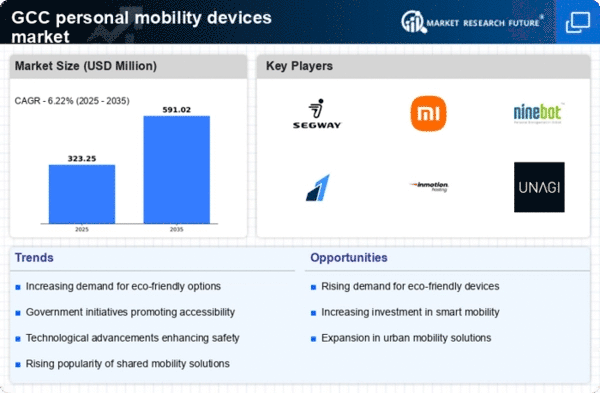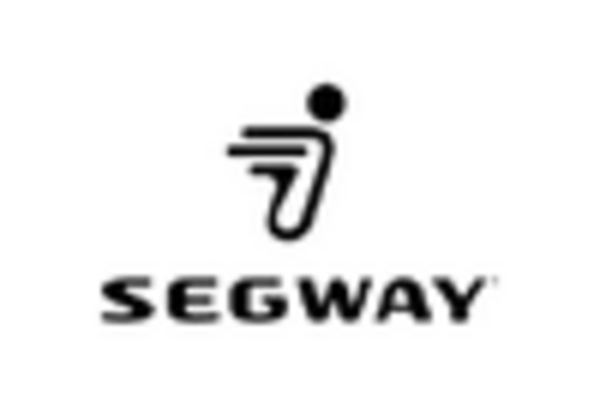Urbanization and Population Growth
The rapid urbanization in the GCC region is a pivotal driver for the personal mobility-devices market. As cities expand and populations increase, the demand for efficient and compact transportation solutions rises. Urban areas are becoming more congested, leading to a shift towards personal mobility devices that offer convenience and ease of use. According to recent data, urban populations in the GCC are projected to grow by over 20% by 2030, which could significantly boost the demand for personal mobility devices. This trend indicates a potential market expansion, as consumers seek alternatives to traditional vehicles that can navigate crowded urban environments more effectively.
Government Initiatives and Regulations
Government policies in the GCC are increasingly favoring the adoption of personal mobility devices. Initiatives aimed at reducing traffic congestion and promoting sustainable transport solutions are being implemented. For instance, several GCC countries have introduced regulations that encourage the use of electric scooters and bicycles, providing incentives for manufacturers and consumers alike. The personal mobility devices market is likely to benefit from these supportive frameworks, as they create a conducive environment for innovation and investment. Furthermore, the GCC governments are investing in infrastructure that supports these devices, such as dedicated lanes and charging stations, which could enhance market growth.
Technological Integration and Smart Features
The integration of advanced technologies into personal mobility devices is transforming the market landscape. Features such as GPS navigation, smartphone connectivity, and smart locking systems are becoming standard in new models. This technological evolution not only enhances user experience but also increases safety and efficiency. The personal mobility-devices market is witnessing a surge in demand for devices equipped with these smart features, as consumers are increasingly tech-savvy and seek products that align with their digital lifestyles. Market data suggests that devices with integrated technology could capture up to 30% of the market share by 2027, indicating a strong trend towards innovation.
Rising Disposable Income and Lifestyle Changes
The increase in disposable income among consumers in the GCC is influencing purchasing behavior in the personal mobility-devices market. As individuals experience improved economic conditions, they are more willing to invest in personal mobility solutions that enhance their lifestyle. This trend is particularly evident among younger demographics, who prioritize convenience and mobility. Market analysis indicates that the personal mobility-devices market could see a growth of 10% annually, driven by this demographic shift. Additionally, lifestyle changes, such as remote work and flexible commuting options, are further encouraging the adoption of personal mobility devices as practical alternatives to traditional transportation.
Environmental Awareness and Eco-Friendly Options
There is a growing awareness of environmental issues among consumers in the GCC, which is driving the demand for eco-friendly personal mobility devices. As individuals become more conscious of their carbon footprints, they are increasingly opting for electric and hybrid models. This shift is reflected in market trends, where sales of electric scooters and bicycles have seen a notable increase, with projections indicating a growth rate of 15% annually. The personal mobility-devices market is likely to expand as manufacturers respond to this demand by developing more sustainable options, aligning with the broader global movement towards greener transportation solutions.
















